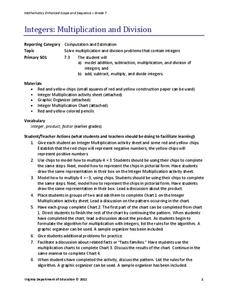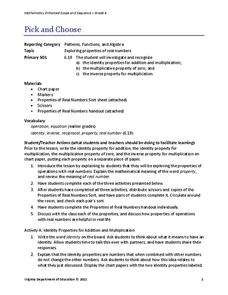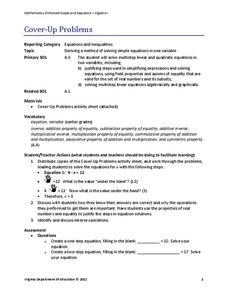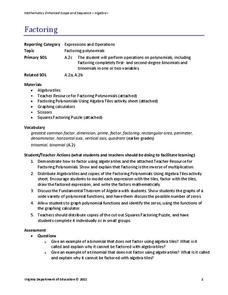West Contra Costa Unified School District
Properties of Multiplication
Unlock the keys to fluent multiplication with this upper-elementary math lesson. After an introduction to the five properties of multiplication, students match cards with different math problems to posters describing each property,...
Virginia Department of Education
Integers: Multiplication and Division
Rules are meant to be broken ... but not integer multiplication and division rules. Learners use chips to model integer multiplication and division. The results of the activity help them develop integer rules for these operations.
West Contra Costa Unified School District
The Power of Ten: Building a Magnitude Model
Add visual representation to teaching place value with a magnitude model. Using adding machine tape, pupils build a linear place value strip from 1 to 100.
Virginia Department of Education
Pick and Choose
Properly teach properties with three activities that allow learners to investigate properties of real numbers. The resource covers the identity properties for addition and multiplication, the inverse property for multiplication, and the...
West Contra Costa Unified School District
Simplifying Fractions Activity
Warm-up pupils' fraction muscles with a four-question quiz, then delve into a learning game designed to reinforce the concept of simplifying fractions. Based on the "I do, We do, You do" method of teaching, the instructional...
EngageNY
Writing and Evaluating Expressions—Exponents
Bring your young mathematicians into the fold. Scholars conduct an activity folding paper to see the relationship between the number of folds and the number of resulting layers in the 23rd installment of a 36-part module. The results of...
Missouri Department of Elementary
Relationships…Quality Control
Quality relationships don't just happen. They require nurturing, patience, thoughtful communication, and honesty. Help tweens develop these relationship skills with an activity that asks them to themselves and then outline a...
Missouri Comprehensive Guidance Programs
Calculating Control/Self-Control
Self-control can seem like such a daunting task, but it doesn't have to be! By participating in this series of small group counseling activities, youngsters learn strategies to help them gain better control of their thoughts and actions.
Virginia Department of Education
Integers: Addition and Subtraction
Young mathematicians construct their own understanding of integers with an inquiry-based math lesson plan. Using colored chips to represent positive and negative numbers, children model a series of addition and subtraction problems as...
Virginia Department of Education
Cover Up Problems
Don't cover up this resource — use it out in the open! Pupils learn how to cover up various parts of a linear equation in order to help solve the equation. A worksheet of problems provides practice with this skill.
University of Missouri
Money Math
Young mathematicians put their skills to the test in the real world during this four-lesson consumer math unit. Whether they are learning how compound interest can make them millionaires, calculating the cost of remodeling their bedroom,...
02 x 02 Worksheets
Factoring
Factor in this resource when teaching how to factor polynomials. Scholars use algebra tiles to factor linear and quadratic expressions. They practice their skill by working on example problems from a worksheet.
Virginia Department of Education
Properties
Examine some properties that don't require a general contractor. Scholars first complete a mental math activity that uses the properties of real numbers. A separate activity formalizes these properties.














